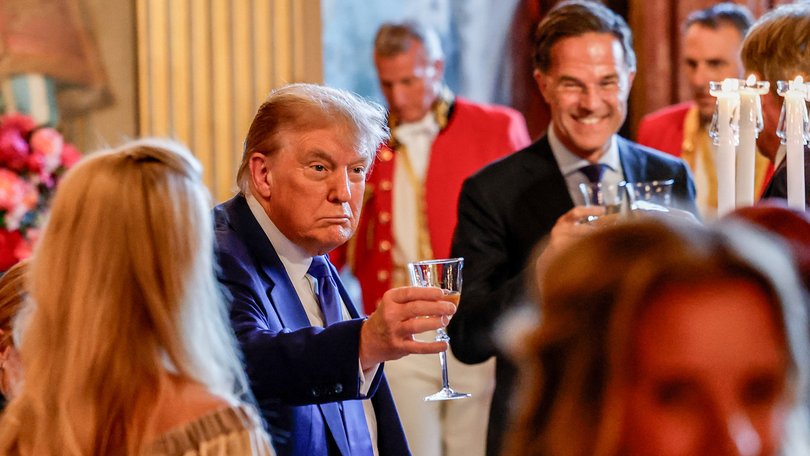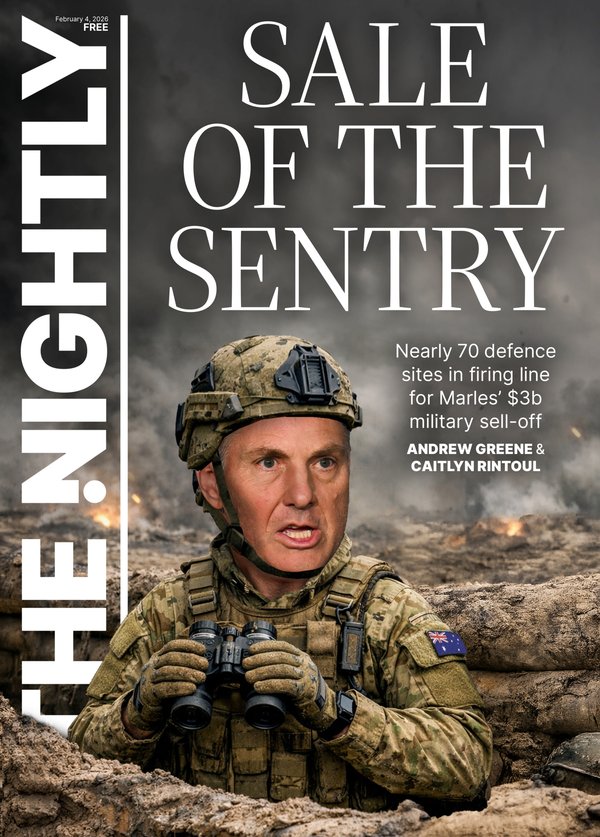Australian news and politics recap: NATO boss Mark Rutte says Donald Trump is ‘totally committed’ to alliance
RECAP: Speaking at NATO, the US President has claimed that Israel and Iran will not renew hostilities following the United States’ tremendous attack’ on Iran’s nuclear facilities.

Scroll down for the latest news and updates.
Key events
25 Jun 2025 - 05:02 PM
‘They’ve had it’: Trump says Israel and Iran are done fighting
25 Jun 2025 - 03:49 PM
Trump up and about and ready to fire at NATO
25 Jun 2025 - 03:13 PM
‘Wishy-washy’: Abbott opposes quotas for Liberal Party women
25 Jun 2025 - 02:41 PM
US ‘totally committed to NATO’, says Rutte
25 Jun 2025 - 01:36 PM
Inside the hours of Trump’s pivot from bombing to ceasefire
25 Jun 2025 - 01:03 PM
Vance reveals Trump’s ‘aggressive’ peace tactic
25 Jun 2025 - 12:43 PM
Albanese hints at possible Trump meeting before China trip
25 Jun 2025 - 11:57 AM
Treasurer rejects calls for higher defence spend
25 Jun 2025 - 11:24 AM
Ley opens up about her experience facing DV, coercive control
25 Jun 2025 - 10:49 AM
Liberal leader Sussan Ley bluntly admits the party was ‘totally smashed’ at May 3 poll
25 Jun 2025 - 10:27 AM
Lowest inflation in four years: Chalmers
25 Jun 2025 - 09:47 AM
Australian cost-of-living improves by 2.1 per cent
25 Jun 2025 - 09:35 AM
Chalmers defends Trump f-bomb as Mideast crisis grows
25 Jun 2025 - 08:42 AM
Lattouf wins landmark ABC unfair sacking case
25 Jun 2025 - 07:44 AM
Greens leader urges international leaders not to forget aid crisis in Gaza
25 Jun 2025 - 07:09 AM
Chalmers to lobby US counterpart on trade tariffs in talks today
25 Jun 2025 - 06:59 AM
Chalmers says several contingencies are in place to get Aussies out of Middle East
25 Jun 2025 - 06:44 AM
Australia childhood vaccination rates lag behind US
25 Jun 2025 - 06:42 AM
‘Lots of volatility, unpredictability, uncertainty in the global economy’: Chalmers
25 Jun 2025 - 06:28 AM
Chalmers says Trump’s blunt language reflects the enormity of the Middle East situation
25 Jun 2025 - 06:05 AM
Over 100 Australians have been safely evacuated from Israel
25 Jun 2025 - 06:02 AM
‘We want to see de-escalation’: Marles
25 Jun 2025 - 05:52 AM
Marles downplays chance of Trump meeting at NATO summit
‘Lots of volatility, unpredictability, uncertainty in the global economy’: Chalmers
Treasurer Jim Chalmers says the global economy is in a “dangerous” place as a result of what is currently unfolding in the Middle East and eastern Europe.
“There’s a lot of volatility, unpredictability, and uncertainty in the global economy,” Mr Chalmers told ABC News Breakfast.
Mr Chalmers says this can be attributed to escalating trade tensions and risks to global demand from the US Administration’s tariff announcements
He assured that Australia is well-placed to deal with the turbulent economic situation, but indicated “we’re not immune from it either.”
“That’s why it’s so important we make our economy more resilient in the face of all this global economy uncertainty, more productive, more sustainable.”
Chalmers says Trump’s blunt language reflects the enormity of the Middle East situation
Treasurer Jim Chalmers has weighed in on US President Donald Trump’s mounting frustration towards Israel and Iran as the two countries violated a ceasefire agreement.
“I think it reflects the gravity, the enormity of the situation in the Middle East, and just how important it is that both sides stick to this ceasefire, which has been negotiated,” Mr Chalmers told ABC News Breakfast when asked if he agreed with the comments Mr Trump made before travelling to the NATO summit.
Mr Trump told a field of reporters at the White House that Israel and Iran “don’t know what the f*** they’re doing” following reports of missiles being struck after the ceasefire began.
“The stakes are very high in the Middle East. The consequences of this ceasefire falling over are pretty grave. And I think the President’s blunt language reflects that,” Mr Chalmers said.
Over 100 Australians have been safely evacuated from Israel
More than 100 Australians and their family members have been safely evacuated from Israel on a special Australian Defence Force (ADF) flight, as the Government ramps up efforts to bring home citizens stranded by the escalating conflict between Israel and Iran.
The ADF’s assisted departure from Tel Aviv carried 119 Australians, marking a significant milestone in ongoing evacuation operations.
The evacuation comes after days of uncertainty for Australians in the region, with airspace closures and the suspension of commercial flights leaving thousands of foreign nationals, including Australians, unable to leave Israel and Iran.
‘We want to see de-escalation’: Marles
Deputy Prime Minister, Richard Marles says Australia is “very much” calling on Iran to stick to the ceasefire.
“What we want to see now is de-escalation. Our concern throughout this has been the potential for escalation, and where this might ultimately lead,” he said, following reports of Iran launching missiles at Israel after US President Donald Trump’s ceasefire announcement.
When asked whether Australia would always back the United States’ use of force, Mr Marles said: “What we’ve done in this instance and what we do in every instance is to speak in accordance with what is Australia’s national interest.”
“It’s not in Australia’s national interest to see Iran acquire a nuclear weapon.”
Marles downplays chance of Trump meeting at NATO summit
The Deputy Prime Minister, Richard Marles, has arrived in The Hague to attend the NATO summit.
Mr Marles is representing Australia after Prime Minister Anthony Albanese decided against attending, despite the possibility of a rescheduled meeting with US President Donald Trump.
Mr Marles said he wouldn’t want to “overstate” the chance of him meeting with Mr Trump.
“Look, I wouldn’t want to overstate that. There’s a lot of people at the NATO summit. There’s a lot of people in the rooms that we’ll all be in. And in gatherings such as this, the meetings that you have end up being pretty fluid,” Mr Marles told the ABC.
Mr Albanese’s planned meeting with Mr Trump on the sidelines of the G7 summit was scrapped after the US President had to return to America amid escalating conflict in the Middle East.
